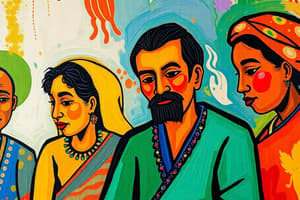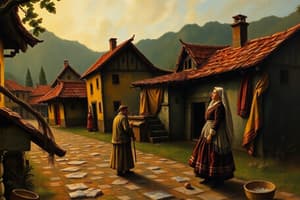Podcast
Questions and Answers
Which of the following is NOT considered a component of tangible heritage?
Which of the following is NOT considered a component of tangible heritage?
- Archaeological sites.
- Architectural heritage.
- Historic objects.
- Festivals and celebrations. (correct)
What is the main focus of intangible cultural heritage?
What is the main focus of intangible cultural heritage?
- Architectural structures and archaeological sites.
- Physical artifacts from the past.
- Languages, customs, and rituals. (correct)
- Traditional craftsmanship and agricultural practices.
What does conservation of tangible heritage prioritize?
What does conservation of tangible heritage prioritize?
- Maximizing tourism revenue.
- Preservation and restoration of historical objects. (correct)
- Adapting heritage practices to modern trends.
- Destruction of replicas and construction of new structures.
How does cultural heritage contribute to social cohesion?
How does cultural heritage contribute to social cohesion?
Which type of heritage provides insight into the evolution of societies?
Which type of heritage provides insight into the evolution of societies?
Why is the preservation of languages important in the context of cultural heritage?
Why is the preservation of languages important in the context of cultural heritage?
Which of the following best describes the significance of artworks in tangible cultural heritage?
Which of the following best describes the significance of artworks in tangible cultural heritage?
What role do festivals and rituals play in cultural heritage?
What role do festivals and rituals play in cultural heritage?
Flashcards are hidden until you start studying
Study Notes
Heritage
Cultural Heritage
- Definition: The legacy of physical artifacts and intangible attributes of a group or society inherited from past generations.
- Components:
- Intangible Cultural Heritage: Traditions, customs, languages, performing arts, rituals, and knowledge systems.
- Languages: Preservation of dialects, oral traditions, and linguistic diversity.
- Festivals and Rituals: Celebrations that reflect cultural practices and social customs.
- Traditional Skills: Craftsmanship, culinary practices, and agricultural knowledge passed down through generations.
- Importance:
- Fosters a sense of identity and belonging.
- Promotes cultural diversity and understanding.
- Encourages social cohesion and community engagement.
Tangible Heritage
- Definition: Physical objects, sites, and monuments that represent cultural significance and historical value.
- Types:
- Architectural Heritage: Buildings, structures, and monuments (e.g., churches, temples, castles).
- Archaeological Sites: Remnants of past civilizations (e.g., ruins, artifacts).
- Artworks: Paintings, sculptures, and decorative arts that hold cultural significance.
- Historic Objects: Items like tools, clothing, and household items that reflect everyday life in the past.
- Conservation:
- Efforts focused on preserving, restoring, and protecting tangible heritage for future generations.
- Importance of sustainable practices to maintain integrity and authenticity.
- Significance:
- Provides insight into the history and evolution of societies.
- Supports tourism and economic development.
- Acts as a repository of collective memory and identity.
Cultural Heritage
- Definition: Encompasses both tangible and intangible elements inherited from past generations, emphasizing cultural identity.
- Intangible Cultural Heritage: Involves non-physical elements, including traditions, languages, performing arts, and knowledge systems that define community practices.
- Languages: The preservation of diverse dialects and oral traditions underscores the importance of linguistic diversity in cultural heritage.
- Festivals and Rituals: Cultural celebrations reflect the values and social customs of a society, fostering community engagement.
- Traditional Skills: Include craftsmanship, culinary practices, and agricultural techniques that have been transmitted through generations.
- Importance: Cultural heritage fosters identity, promotes understanding among diverse cultures, and enhances social cohesion within communities.
Tangible Heritage
- Definition: Comprises physical objects, sites, and monuments that hold cultural significance and historical value.
- Types of Tangible Heritage:
- Architectural Heritage: Includes historically significant structures such as churches, temples, and castles.
- Archaeological Sites: Remnants that provide insight into past civilizations, including ruins and artifacts.
- Artworks: Encompasses culturally significant paintings, sculptures, and decorative items.
- Historic Objects: Everyday items such as tools and clothing that represent the lifestyle of previous eras.
- Conservation: Focuses on preserving and restoring tangible heritage, emphasizing sustainable methods to maintain their integrity and authenticity.
- Significance: Serves as a window into the history and development of societies, supports tourism and economic growth, and holds collective memory and identity for communities.
Studying That Suits You
Use AI to generate personalized quizzes and flashcards to suit your learning preferences.




